Indeed, the best Broadway show is not in New York at all, but has taken up
momentary residence at the company’s home in the intimate Loretto Hilton
Theatre. The triumph begins with the exemplary cast.
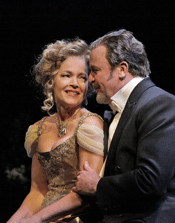 Amy Irving as Desiree Armfeldt and Ron Raines as Fredrik Egerman in A Little Night Music [Photo by Ken Howard courtesy of Opera St. Louis]
Amy Irving as Desiree Armfeldt and Ron Raines as Fredrik Egerman in A Little Night Music [Photo by Ken Howard courtesy of Opera St. Louis]
Amy Irving was born to play Desiree Armfeldt. One of the world’s most
glamorous women, she has allowed herself to age ever so gracefully. She wholly
understands the heroine’s survival instincts but tempers them with a hint
of pathos and melancholy that softens the bitchy edges of the writing. She is
earthy without becoming earth-bound. Her dusky-verging-on-husky vocal
instrument is a perfect match for the music Mr. Sondheim conceived for Glynis
Johns. While alluringly petite, she nevertheless embodies huge star presence,
not only necessary for the actress character she is playing, but totally
dominating the tale at hand.
Ron Raines is decidedly her equal, offering the best Frederick Egermann of
my experience. Has anyone ever sung this role with such a rich, ringing
baritone? Or found such nuance in even the most tongue-tying patter? Or
discovered such freshness and wit in Hugh Wheeler’s banter? Mr. Raines
has infused Egerman with an inner spark that allows him to be world weary
without making us weary.
As Madame Armfeldt, Si‚n Phillips not only has the most perfect diction I
have encountered in many a moon, but she has a comic timing that hits more
bulls eye’s than Annie Oakley. Her rendition of “Liaisons”
could be offered as a Masters Class of song delivery, a mini-drama that
relished and diversified every turn of plot. That Ms. Phillips could still make
me laugh out loud at comic material I know from memory is testament to her
skill. Her condescending delivery of the word “raisins” was alone
worth the price of admission.
Amanda Squitieri is perfection as the virginal wife Anne, singing with
precision and beauty and approximating the flightiness and experience of a
young woman with nary a false move. Although dashing Christopher Herbert as the
young son Henrik is a baritone, he negotiated the high flying tenorial phrases
very winningly, and found a sweet core of heartsickness to temper his outward
insufferability. The young Vivian Krich-Brinton was delectable as the daughter
Frederika, whose singing was strong and true, and whose stage savvy left
nothing to be desired.
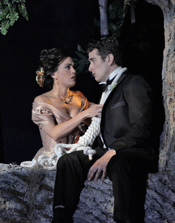 Amanda Squitieri as Anne Egerman and Christopher Dylan Herbert as Henrik Egerman in A Little Night Music [Photo by Ken Howard courtesy of Opera St. Louis]
Amanda Squitieri as Anne Egerman and Christopher Dylan Herbert as Henrik Egerman in A Little Night Music [Photo by Ken Howard courtesy of Opera St. Louis]
Lee Gregory as Carl-Magnus and Erin Holland as his long-suffering wife
Charlotte offered intriguing takes on their characters. At first I thought
Mr.Gregory’s Dudley Do-Right approach might not wear well, but his utter
belief in it, and relentless delivery of it ended up being a very satisfying
portrayal. Coming off more the stupid prat than usual, the story was the richer
for it. Ms. Holland was less acerbic than others I have seen as Charlotte, with
more rounded edges and more genuine love for her errant soldier. What she lost
in bite zinging some of her zingers, she made up for in empathy for her plight
as his pawn.
Candra Savage was an especially pretty Petra, with an easy stage presence
and a natural sexiness that made for amusing character interactions, and more.
. .such as the sultry seduction with Matthew Lau’s lusty Frid. Ms. Savage
delivered one of the show’s highlights: an assured and powerful rendition
of The Miller’s Son. The Liebeslieder Quintet of singers were
wonderfully matched, soloing magnificently and blending smoothly as required:
Aaron Agulay (Mr. Lindquist), Lauren Jelencovich (Mrs. Nordstrom), Corinne
Winters (Mrs. Anderssen), Mark Van Arsdale (Mr. Erlanson) and Laura Wilde (Mrs.
Segstrom). While they are too young to sing about “remembering”
sexual peccadilloes that are well in the past, they are endearing, poised,
attractive, and sing the hell out Sondheim’s complex vocal writing.
Conductor Stephen Lord is eliciting ravishing playing from the orchestra and
he has an unerring musical comedy sensibility. I heard color combinations and
instrumental licks I never noticed before. Jonathan Tunick’s superb
orchestration can seldom, if ever been heard to such fine advantage.
The mutli-talented Isaac Mizrahi was the Triple Theatre Stage Director,
Setting, and Costume Designer. (Isaac must have run out of time to design and
hand out the programs as well, but if he had we would have been the richer for
it.) Boris Aronson’s original scenic concept was all tracked scenery and
cinematic dissolves which informed how the piece developed and was played. The
St.Louis thrust stage affords no such possibilities for computerized movement,
but Mr. Mizrahi turned this limitation into an asset.
First, he imagined a magnificent forest of massive trees, suitable for
climbing and perching, and a lush green grassy ground cloth. Then he
choreographed his cast to move well-chosen set pieces on and off without
stealing focus as the action/music continued. Only twice did we have to wait a
few seconds for the setting to be completed (placing and removing the massive
dinner party table), but frankly it hardly mattered as we were entertained by
some additional piano noodling. Similarly his costumes were absolutely right,
from the stuffy straight-jacketed business and formal attire to the suggestive
undergarments and accoutrement’s of the half-dressed cast members
lounging (and longing) on stage when we entered the auditorium. I was only
distracted by the inconsistency of some of the servants and quintet having cute
little angel wings attached (cupids? angels? fireflies?) and others did not.
Mizrahi the director struck an uncommonly fine balance between Scandanavian There are easier things than launching a new comic family friendly opera, And, indeed, it mostly worked very very well. I cannot imagine how difficult Composer Ash seems to have been influenced by every composer of the last This was a lot to take in on one viewing, but I would suggest that some of A large part of the actors’ total success in creating these iconic Bruno Schwengl’s amazingly mobile and versatile scenery was also Ingenious. Greg Emetaz was equally effective in devising stage-filling, I admired James Robinson’s stage direction more for its astounding Daniel Okulitch is making a wholly successful debut in the dual roles of Mr. Michael Kepler Meo was simply a splendid young Charlie. His concentration Spitfire Tracy Dahl was first among equals as the competing Violet Among the adults, Frank Kelley was a stand-out as Grandpa Joe. He not only From the There-Are-No-Small-Roles Department: One the highlights of The On the basis of the one-two punch of A Little Night Music and James Sohre The Golden Ticket — Charlie: Michael Kepler Meo; Mr. Know/Willy Wonka: Daniel Okulitch; Mike Teavee: David Trudgen; Veruca Salt: Jennifer Rivera; Lord Salt: David Kravitz; Violet Beauregard: Tracy Dahl; Augustus Gloop: Andrew Drost; Grandpa Joe: Frank Kelley; Beauregard/Grandpa George: Oren Gradus; Mrs. Gloop/Grandma Georgina: Kristin Clayton; Mrs. Teavee/Grandma Josephine: MaryAnn McCormick; Candy Mallow/Squirrelmistress: Jennifer Berkebile. Conductor: Timothy Redmond. Stage Director: James Robinson. Set Designer: Bruno Schwengl. Costume Designer: Martin Pakledinaz. Lighting Designer: Christopher Akerlind. Wig & Makeup Design: Tom Watson. Choreographer: SÈan Curran. Chorus Master: Sandra Horst.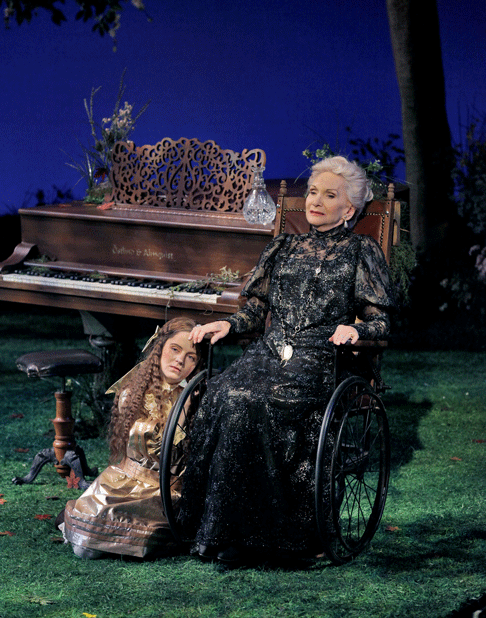 (L to R) Vivian Krich-Brinton as Fredrika Armfeldt and Si‚n Phillips as Madame Armfeldt in A Little Night Music [Photo by Ken Howard courtesy of Opera St. Louis
(L to R) Vivian Krich-Brinton as Fredrika Armfeldt and Si‚n Phillips as Madame Armfeldt in A Little Night Music [Photo by Ken Howard courtesy of Opera St. Louis
straight forwardness and American musical sentimentality. His scene work was
beautifully inventive and laced with subtext. He made full use of the thrust
stage and the variety of possibilities it affords. I thought I would never see
a production of A Little Night Music to challenge my memory of that
glorious Hal Prince original. I was wrong.
like. . . rocket science, perhaps. But OTSL scored another major success with
its world premiere of composer Peter Ash’s and librettist Donald
Sturrock’s The Golden Ticket, a musicalization of “Charlie
and the Chocolate Factory” by Roald Dahl. I think I am one of three
people in the world who have not read the source material nor seen the Willie
Wonka film incarnations. And I decided to keep it that way, coming to the piece
with no background at all to see how it worked on its own merits.
it must be to give legs to a new comedy, much less compounding the comic timing
with the challenge of having to sing the set-ups and punch lines. Both composer
and librettist displayed considerable wit and imagination, and Mr. Ash made the
orchestra a willing accomplice with characterful inventions, including a frat
boy-level bassoon “fart” (ya had to be there).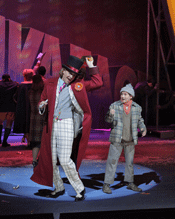 (L to R) Daniel Okulitch as Willy Wonka and Michael Kepler Meo as Charlie in The Golden Ticket [Photo by Ken Howard courtesy of Opera St. Louis]
(L to R) Daniel Okulitch as Willy Wonka and Michael Kepler Meo as Charlie in The Golden Ticket [Photo by Ken Howard courtesy of Opera St. Louis]
century, not least of which Leonard Bernstein who in turn borrowed from every
composer who ever lived (and a few who didn’t). There are hints of
Prokoviev, Barber, Janacek, Britten, Dove, Ades, and Corigliano, although Mr.
Ash manages to contrive his own unique aural palette that suits the work at
hand very well indeed. I was also impressed that he seems to have created a
rather distinctive musical personality for each character, with well considered
evocations of traditional operatic set pieces and arias. If some of the
noodling and fidgeting gets restless, and some of the solos stretch on a bit
long, this is contrasted with some affecting arioso moments and some truly
sublime choral writing. All in all, aurally and dramatically the piece is
accessible, interesting, and highly entertaining. Much of the musical success
must lie with conductor Timothy Redmond, who led the reduced orchestra (think
“Albert Herring” or “Ariadne”) with great conviction,
rhythmic precision, and rhapsodic sweep.
the Act Two scenes in which each of the bratty children get their comeuppance
slightly exceed our interest level. After the first gets trapped in his own
greed, there is a predictability that the same fate awaits the others in turn,
save Good Boy Charlie. I would urge that the creative team look to tighten
those individual “just rewards” scenes to get us all the sooner to
the ennoblement of our young hero. I also thought the finale of Act One might
be mis-judged, ending with a whimper instead of a bang. Ninety per cent of the
writing landed so beautifully that I would hope that further mountings will
give the creators the opportunity to fine tune “Ticket.”
characters has to be credited to the dazzling costumes by Martin Pakledinaz,
abetted by the extensive array of wigs and specialty make-up by Tom Watson. The
Lady Squirrels, the Oompa Loompas, the pink-suited news anchor woman, the
arch-stereotypes of the contentious children, all of the attire was colorful,
creative, and spot-on.
first-rate and did not miss a trick in supporting the requisite special effects
whether it be the inflatable chocolate river, the transformation of a child
into a giant blueberry, or a star entrance for Willie Wonka in a balloon.
scrolling and rolling candy projections, as well as cheeky videos that worked
wonders in facilitating the scenic journey through Candy land. Not to be
outdone, lighting designer Christopher Akerlind greatly enhanced the
production, most especially with beautiful specials, isolation effects, and a
well-chosen mix of color filters. This was one of those instances where the
limitations of the facility inspired the designers to exceptionally pleasing
results.
traffic management (people and scenery) than for its revelatory detail. That
Mr. Robinson kept things focused and moving fluidly is no mean feat, but
occasionally characters seemed to be left hanging. Willie Wonka, for example,
at the end of One gamely keeps improvising a hop-skip-step, twirling his cane
and performing a hat trick, but the repetition, no matter how enthusiastically
executed, wore thin. Too, as each child gets trapped in a fate of their own
doing in Act Two, the accompanying parent/guardian is left wringing their hands
and blustering within their own devices for too long, losing credibility. As I
suggested above, perhaps tightening these sections will benefit all concerned,
but in the meantime, the director has not always created wholly fulfilling
moments with the piece he has been handed. Most curiously, it seemed to me as
if the entire show was played straight front, with the assembled forces often
lining up stage right to stage left, ignoring the audience segments off the
thrust left and right. Curious indeed from one who knows the space so well.
Know and Willie Wonka. He is a stage creature, possessed of an easy presence
and considerable charm. When he smiles conspiratorially at the audience we are
quite helpless to resist this Pied Piper with a heart of chocolate. He sports a
very secure lyric baritone, which blooms exponentially as it ascends. Mr.
Okulitch is also capable of heart-stoppingly beautiful sotto voce effects, and
it was a pity that his long aria did not have a musical “button” so
that we could lavish him with applause for singing it so well. He sensibly does
not push his voice hard below say, ‘f’ or so, meaning the
infrequent lower lying passages were hard to make out. But for star wattage in
this crucial role, Okulitch emphatically delivered the goods.
and natural stage presence would be the envy of many an adult singer. He is
possessed of an uncommonly lovely soprano, and he sings the most complicated
phrases with security and tonal beauty. Although body-miked, we still lost a
few of his phrases in the lower range when the orchestration competed rather
than complemented. But his was a magnificent achievement.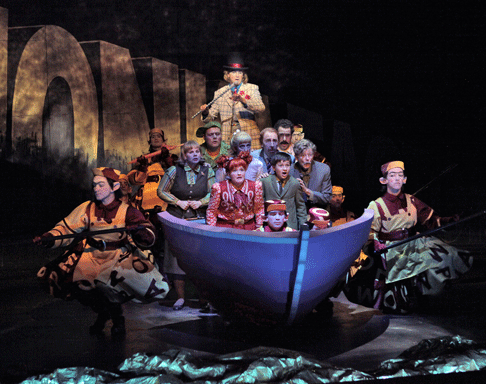 A scene from The Golden Ticket [Photo by Ken Howard courtesy of Opera St. Louis]
A scene from The Golden Ticket [Photo by Ken Howard courtesy of Opera St. Louis]
Beauregard, a mini-Dale Evans in search of a heifer to brand. She fearlessly
executed some of the most fiendishly difficult coloratura this side of
“Grossmaechtige Prinzessin” with such clarity and precision that I
long to hear her someday as a world class Zerbinetta. Lean and lanky Jennifer
Rivera was the snotty cheerleader Veruca Salt, displaying a steely high-flying
mezzo that could also pull back to more mellow tones. David Trudgen slammed out
such ear-pinning high notes as Mike Teavee that he might have been auditioning
for “Ah, mes amis.” As with the other vocal writing for the brats,
his music was often excitable, conversational and angular so it was hard to
judge what his legato singing in the passagio might be like, characterized here
with some gear-changing at times. But, boy does Trudgen have the money notes.
As Augustus Gloop, Andrew Drost showed off a solid counter-tenor with more bite
than most in the upper register, and unafraid to dip into baritonal sounds as
the role required at the lower end.
sang dreamily, but he alone tugged at my heartstrings with a deeply felt
emotional portrayal. Oren Gradus was wonderful as ever as Mr. Beauregard and
Grandpa George; Kristin Clayton brought her pleasing soprano to Mrs. Gloop and
Grandma Georgina; MaryAnn McCormick was highly effective as Grandma Josephine
and (especially) Mrs. Teavee; and Andrew Dost brought variety and firm vocal
presence to Lord Salt. In her dual duty as the perky/bitchy Candy Mallow and
the hyper-active Squirrelmistress, Jennifer Berkebile offered pristine singing
and assured presence.
Golden Ticket for me was Nick Fitzer’s brief but superbly vocalized
turn as the Solo Oompa Loompa. No fooling folks, this young lyric tenor is a
guy to watch. OTSL must think so, too since Nick is one of the Gerdine Young
Artists. As usual, the ensemble of Young Artists provided choral singing of the
highest caliber under the direction of Sandra Horst, and cleanly executed SÈan
Curran’s inventive choreography.
The Golden Ticket, in the US summer opera sweepstakes Opera Theatre of
St. Louis remains the winner and still champeen.
image=http://www.operatoday.com/11GoldenTicket01.jpg.gif
image_description=Michael Kepler Meo as Charlie in Opera Theatre of Saint Louis’s 2010 production of The Golden Ticket [Photo by Ken Howard]
product=yes
product_title=
product_by=A Little Night Music — Desiree Armfeldt: Amy Irving; Mdm. Armfeldt: Si‚n Phillips; Henrik Egerman: Christopher Herbert; Fredrik Egerman: Ron Raines; Anne Egerman: Amanda Squitieri; Carl-Magnus Malcolm: Lee Gregory; Charlotte Malcolm: Erin Holland; Fredrika Armfeldt: Vivian Krich-Brinton; Petra: Candra Savage; Mr. Lindquist: Aaron Agulay; Mrs. Nordstrom: Lauren Jelencovich; Mrs. Anderssen: Corinne Winters; Mr. Erlanson: Mark Van Arsdale; Mrs. Segstrom: Laura Wilde; Frid: Matthew Lau. Conductor: Stephen Lord. Stage Director, Set/Costume Designer: Isaac Mizrahi. Lighting Designer: Michael Chybowski. Wig and Makeup Design: Tom Watson. Choreographer: Se·n Curran.
product_id=Above: Michael Kepler Meo as Charlie in The Golden Ticket [Photo by Ken Howard courtesy of Opera St Louis]